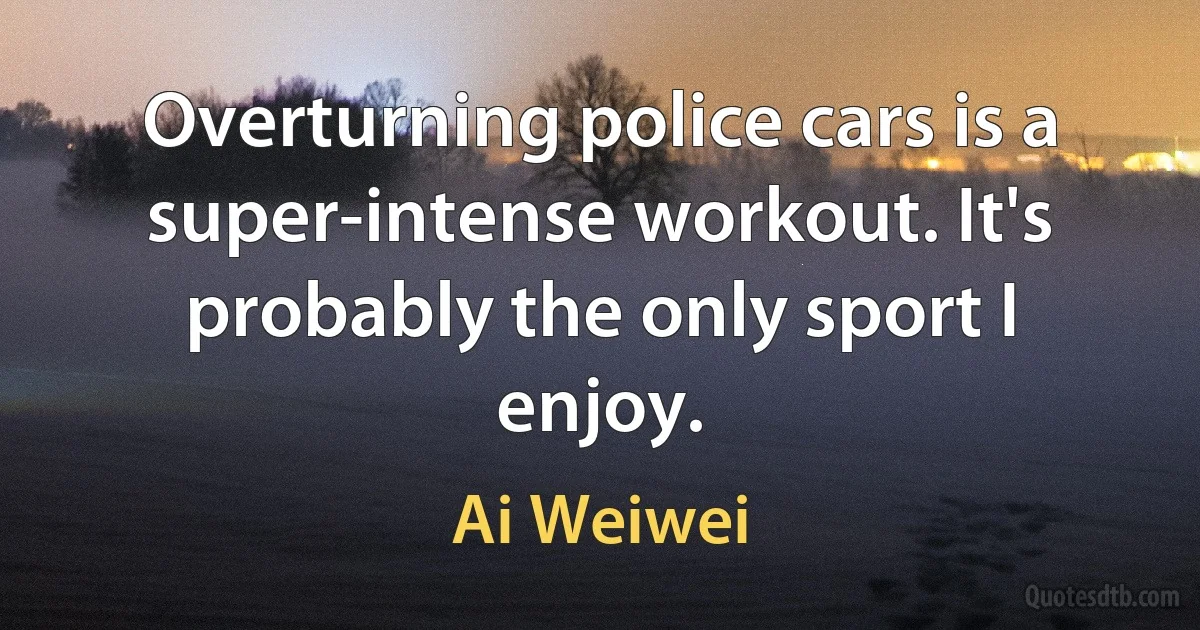Overturning Quotes
Life is also busy transporting and overturning the soils of earth, the stones, and the minerals. The miles-long drifts of sea kelp that float along our coasts may carry hundreds of tons of volcanic boulders held in their roots. I have followed these streams of life over 300 km, and seen them strand on granite beaches, throwing their boulders up on a 9,000 year old pile of basalt, all the hundreds of tons of which were carried there by kelp.

Bill Mollison
When I say that this phase is necessary, the word phase is perhaps not the most rigorous one. It is not a question of a chronological phase, a given moment, or a page that one day simply will be turned, in order to go on to other things. The necessity of this phase is structural; it is the necessity of an interminable analysis: the hierarchy of dual oppositions always reestablishes itself. Unlike those authors whose death does not await their demise, the time for overturning is never a dead letter.

Jacques Derrida
...the French business is no light or trivial thing, or such as has commonly occurd in the course of political Events. At present the whole political State of Europe hinges upon it. On the Continent there is little doubt; every thing will take is future shape and colour from the good or ill success of the Duke of Brunswick. In my opinion, it is the most important crisis that ever existed in the World. ... My poor opinion is, that these principles...cannot possibly be realized in practice in France, without an absolute certainty and that at no remote period, of overturning the whole fabrick of the British Constitution.

Edmund Burke
[...]his back is fairly turned?
The pair of goodly palaces are burned,
The gardens ravaged, and your Guelf is drunk
A week with joy; the next, his laughter sunk
In sobs of blood, for he found, some strange way,
Old Salinguerra back again; I say
Old Salinguerra in the town once more
Uprooting, overturning, flame before
Blood fetlock-high beneath him; Azzo fled;
Who scaped the carnage followed; then the dead
Were pushed aside from Salinguerra's throne.
He ruled once more Ferrara, all alone.
Till Azzo, stunned awhile, revived, would pounce;
Coupled with Boniface, like lynx and ounce.

Robert Browning
It is not with a view of overturning our institutions that I advocate these reforms in our representative system. It is because I believe that we may carry out these reforms from time to time, by discussions in this House, that I take my part in advocating them in this legitimate manner. They must be effected in this mode, or as has been the case on the Continent, by bayonets, by muskets, and in the streets. Now, I am no advocate for such proceedings. I conceive that men of political standing in this country-any Members of this House for instance-who join in advocating the extension of the suffrage at this moment, are the real conservators of peace.

Richard Cobden
I say: liberate yourself as far as you can, and you have done your part; for it is not given to every one to break through all limits, or, more expressively, not to everyone is that a limit which is a limit for the rest. Consequently, do not tire yourself with toiling at the limits of others; enough if you tear down yours. [...] He who overturns one of his limits may have shown others the way and the means; the overturning of their limits remains their affair.

Max Stirner
Money, then, appears as this overturning power both against the individual and against the bonds of society, etc.,which claim to be essences in themselves. It transforms fidelity into infidelity, love into hate, hate into love, virtue into vice, vice into virtue, servant into master, master into servant, idiocy into intelligence and intelligence into idiocy.

Karl Marx
If Walter Bagehot was right that "one of the greatest pains to human nature is the pain of a new idea,” Ken caused an extraordinary amount of pain. Both in his economic thinking and in his political activities, he was dedicated to resisting, and where possible overturning, what he famously called "conventional wisdom” (one of his many turns of phrase that have since become commonplace locutions). Rejecting the standard economic theory based on small, anonymous households and firms that autonomously engage in perfectly functioning markets, Ken instead saw an economic stage dominated by large, nameable actors: big business, big labor, big government. Sorting out their roles and respective power was central to his analysis, and the continually shifting tensions in the interplay among them-"countervailing power” in another of his deft phrases-was the real story of how an economy behaved.

Amartya Sen
For the first time in American history, the Executive Branch of our government has not only condoned but actively promoted the treatment of captives in wartime that clearly involves torture, thus overturning a prohibition established by General George Washington during the Revolutionary War.

Al Gore
I like to see a man proud of the place in which he lives. I like to see a man live so that his place will be proud of him. Be honest, but hate no one; overturn a man's wrongdoing, but do not overturn him unless it must be done in overturning the wrong. Stand with a man while he is right, and part with him when he goes wrong.

Abraham Lincoln
There's simultaneously something rigorous and something playful in genre. It's about the positing of something impossible-whether not-yet-possible or never-possible-and then taking that impossibility and granting it its own terms and systematicity. It's carnivalesque in its impossibility and overturning of reality, but it's rationalist in that it pretends it is real. And it's that second element which I think those who dip their toes in the SF pond so often forget. They think sf is "about” analogies, and metaphors, and so on. I refute that-I think that those are inevitable components, but it's the surrendering to the impossible, the weird, that characterizes genre. Those flirting with SF don't surrender to it; they distance themselves from it, and have a neon sub-text saying, "It's okay, this isn't really about spaceships or aliens, it's about real life,” not understanding that it can be both, and would do the latter better if it was serious about the former.

China Miéville
In the Name of Allah, the Most Beneficent, the Most Merciful. This is the (final) command of Abu Bakr ibn Abd Quhafah, which he writes as he is exiting this world of the Hereafter... a time during which a disbeliever comes to believe, a wicked-doer comes to have faith, and a liar tells the truth: Verily, I appoint over you Umar ibn al-Khattab as my successor, so listen to him and obey him... If he acts justly, then that is what I think of him and that is what I know about him. But if he changes for the worse (i.e., he begins to act unjustly), then for each person is that which he has earned. Goodness is what I wanted, and I do not know anything of the Unseen world. "And whose who do wrong will come to know by what overturning they will be overturned." Quran, Chapter 26, verse 227.

Abu Bakr



